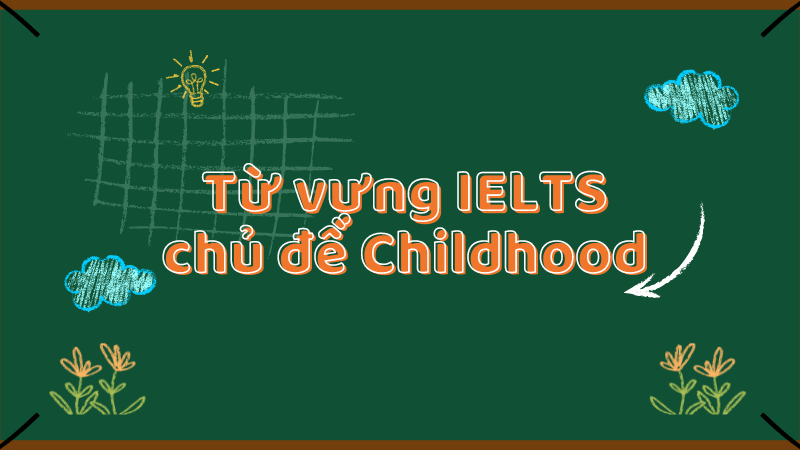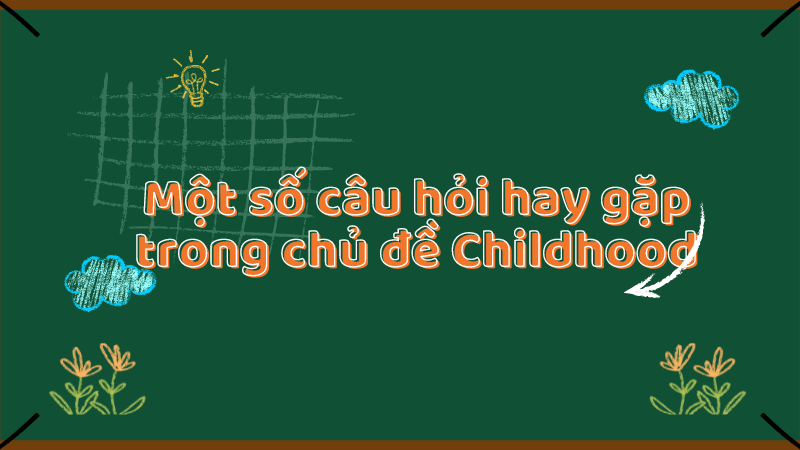Từ vựng IELTS chủ đề Childhood không chỉ giúp bạn đạt điểm cao trong bài thi IELTS mà còn giúp bạn giao tiếp hiệu quả hơn trong cuộc sống hàng ngày. Hãy cùng Edmicro khám phá những từ vựng phong phú để kể về tuổi thơ của mình một cách sinh động nhé!
Từ vựng IELTS chủ đề Childhood
Hãy cùng Edmicro học những từ vựng hay và thú vị về chủ đề Childhood trong IELTS tại bảng dưới đây:

| Số TT | Từ tiếng Anh | Phiên âm | Loại từ | Nghĩa | Ví dụ |
|---|---|---|---|---|---|
| 1 | Childhood | /ˈtʃaɪldhʊd/ | Noun | Tuổi thơ | Lily has nice memories about her childhood. (Lily có nhiều kỷ niệm đẹp về tuổi thơ.) |
| 2 | Memory | /ˈmeməri/ | Noun | Kỷ niệm | Nam’s childhood memories are filled with laughter and joy. (Những kỷ niệm tuổi thơ của Nam tràn ngập tiếng cười và niềm vui.) |
| 3 | Play | /pleɪ/ | Verb | Chơi | We used to play hide-and-seek in the garden. (Chúng tôi thường chơi trốn tìm ở trong vườn.) |
| 4 | Game | /ɡeɪm/ | Noun | Trò chơi | Lan’s favorite game as a child was hopscotch. (Trò chơi yêu thích của Lan khi còn nhỏ là ô ăn quan.) |
| 5 | Toy | /tɔɪ/ | Noun | Đồ chơi | Khanh had a collection of toys when he was a child. (Khánh có một bộ sưu tập đồ chơi khi còn nhỏ.) |
| 6 | Friend | /frend/ | Noun | Bạn | Hung’s best friend from childhood still lives nearby. (Người bạn thân thời thơ ấu của Hùng vẫn sống gần đây.) |
| 7 | Family | /ˈfæməli/ | Noun | Gia đình | Tung grew up in a large and loving family. (Tùng lớn lên trong một gia đình lớn và yêu thương.) |
| 8 | Hometown | /ˈhoʊmtaʊn/ | Noun | Quê hương | Tuan’s hometown is a small village in the countryside. (Quê hương của Tuấn là một ngôi làng nhỏ ở vùng nông thôn.) |
| 9 | School | /skuːl/ | Noun | Trường học | My went to a small primary school in my hometown. (My đã học tiểu học ở một ngôi trường nhỏ tại quê nhà.) |
| 10 | Neighborhood | /ˈneɪbərhʊd/ | Noun | Hàng xóm | Alex used to play with the kids in his neighborhood. (Alex thường chơi với những đứa trẻ trong xóm.) |
| 11 | Grow up | /ɡroʊ ʌp/ | Phrasal verb | Lớn lên | Brown grew up in a small town. (Brown lớn lên ở một thị trấn nhỏ.) |
| 12 | Playmate | /ˈpleɪmeɪt/ | Noun | Bạn cùng chơi | Ha’s playmates and her would spend hours building sandcastles. (Hà và những người bạn cùng chơi thường dành hàng giờ để xây lâu đài cát.) |
| 13 | Adventurous | /ədˈventʃərəs/ | Adjective | Phiêu lưu | As a child, White was very adventurous and loved exploring new places. (Khi còn nhỏ, White rất thích phiêu lưu và khám phá những nơi mới.) |
| 14 | Imaginative | /ɪˈmædʒɪnətɪv/ | Adjective | Giàu trí tưởng tượng | Timmy had a very imaginative mind as a child. (Timmy có một trí tưởng tượng rất phong phú khi còn nhỏ.) |
| 15 | Nostalgic | /nɒˈstældʒɪk/ | Adjective | Hoài niệm | Looking at old photos makes Nam feel nostalgic. (Nhìn những bức ảnh cũ khiến Nam cảm thấy hoài niệm.) |
| 16 | To have a vivid imagination | /hæv ə ˈvɪvɪd ɪˌmædʒɪˈneɪʃn/ | Cụm từ | Có trí tưởng tượng phong phú | Children have very vivid imaginations. (Trẻ em có trí tưởng tượng rất phong phú.) |
| 17 | To be full of energy | /biː fʊl əv ˈenədʒi/ | Cụm từ | Đầy năng lượng | As a child, Kevin was always full of energy. (Khi còn nhỏ, Kevin luôn tràn đầy năng lượng.) |
| 18 | To be innocent | /biː ˈɪnəsnt/ | Adjective | Ngây thơ | Children are innocent and curious about the world. (Trẻ em luôn rất ngây thơ và tò mò về thế giới.) |
| 19 | To have a formative experience | /hæv ə ˈfɔːrmətɪv ɪkˈspɪəriəns/ | Cụm từ | Có một trải nghiệm định hình | Growing up in a rural environment was a formative experience that shaped my outlook on life. (Lớn lên ở một vùng quê là một trải nghiệm định hình quan điểm sống của tôi.) |
| 20 | To foster a love of | /fɒstər ə lʌv əv/ | Cụm từ | Nuôi dưỡng tình yêu đối với | My parents fostered a love of reading in me from a young age. (Bố mẹ tôi đã nuôi dưỡng tình yêu đọc sách trong tôi từ khi còn nhỏ.) |
| 21 | To be instilled with | /biː ɪnˈstɪld wɪð/ | Cụm từ | Được truyền cảm hứng | I was instilled with a strong sense of curiosity as a child. (Tôi được truyền cảm hứng với một tinh thần tò mò mãnh liệt khi còn nhỏ.) |
| 22 | To look back fondly on | /lʊk bæk ˈfɒndlɪ ɒn/ | Cụm từ | Nhìn lại với niềm yêu mến | I look back fondly on the days when I would spend hours building sandcastles. (Tôi nhìn lại với niềm yêu mến những ngày tháng dành hàng giờ để xây lâu đài cát.) |
| 23 | To be steeped in | /biː stiːpt ɪn/ | Cụm từ | Đắm mình trong | My childhood was steeped in tradition and culture. (Tuổi thơ của tôi đắm mình trong truyền thống và văn hóa.) |
| 24 | To have a profound impact on | /hæv ə prəˈfaʊnd ˈɪmpækt ɒn/ | Cụm từ | Có ảnh hưởng sâu sắc đến | My childhood experiences had a profound impact on the person I am today. (Những trải nghiệm tuổi thơ đã có ảnh hưởng sâu sắc đến con người tôi hiện tại.) |
| 25 | To come of age | /kʌm əv eɪdʒ/ | Cụm từ | Trưởng thành | My came of age during a time of great social change. (My lớn lên trong thời kỳ thay đổi xã hội lớn.) |
| 26 | To be a rite of passage | /biː ə raɪt əv ˈpæsɪdʒ/ | Cụm từ | Là một nghi lễ trưởng thành | Graduating from high school was a rite of passage for me. (Tốt nghiệp trung học là một nghi lễ trưởng thành đối với tôi.) |
| 27 | To have a turbulent childhood | /hæv ə ˈtɜːbjələnt ˈtʃaɪldhʊd/ | Cụm từ | Có một tuổi thơ đầy biến động | She had a turbulent childhood due to her family’s financial difficulties. (Cô ấy có một tuổi thơ đầy biến động do khó khăn tài chính của gia đình.) |
| 28 | To shape one’s personality | /ʃeɪp wʌnz ˌpɜːsəˈnæləti/ | Cụm từ | Hình thành tính cách | Our childhood experiences shape our personality. (Những trải nghiệm tuổi thơ hình thành nên tính cách của chúng ta.) |
Xem thêm: As A Result Là Gì? 5 Phút Nắm Trọn Kiến Thức Quan Trọng
Một số câu hỏi hay gặp trong chủ đề Childhood
Dưới đây là một số câu hỏi thường gặp trong chủ đề childhood cùng cách trả lời gợi ý. Các bạn cùng theo dõi nhé!

- What was your childhood like?
My childhood was an idyllic period characterized by a sense of wonder and limitless possibilities. Growing up in a small, coastal town, I spent countless hours exploring the nearby woods and beaches. These experiences fostered a deep-rooted love for nature and instilled in me a sense of adventure that has stayed with me to this day.
- Where did you grow up?
I was raised in a quaint, little village nestled amidst rolling hills. Surrounded by lush greenery and a tight-knit community, I enjoyed a peaceful and carefree upbringing. The tranquility of my rural surroundings provided the perfect backdrop for my formative years.
- What kind of games did you play when you were a child?
As a child, I was quite imaginative and loved to engage in imaginative play. I would spend hours lost in fantastical worlds, creating intricate stories and adventures for my toys. Additionally, I enjoyed outdoor activities such as climbing trees, playing tag, and building forts with my friends.
Xem thêm: Từ Vựng IELTS Chủ Đề Shopping – Chinh Phục Từ Vựng Hay Nhất Trong Tiếng Anh
- Describe a happy memory from your childhood.
One of my fondest childhood memories is of a family camping trip to a remote lake. The nights were filled with laughter, storytelling, and gazing up at a sky ablaze with stars. It was during this trip that I developed a profound appreciation for the beauty of nature and the importance of spending quality time with loved ones.
- Describe a toy that was important to you when you were a child.
A cherished possession from my childhood was a vintage wooden train set. Hours were spent constructing intricate tracks and orchestrating elaborate train journeys. The train set not only sparked my imagination but also taught me about engineering and problem-solving.
- Describe a place you liked to go to when you were a child.
My favorite place to visit as a child was the local library. The library was a treasure trove of knowledge and adventure. I would spend hours wandering the aisles, discovering new books, and losing myself in imaginative worlds.
- How has childhood changed in recent years?
Childhood has undergone a significant transformation in recent decades, primarily due to technological advancements. With the advent of smartphones and tablets, children today have access to a vast array of digital entertainment options, which has led to a decline in traditional outdoor play and social interaction. While technology offers numerous benefits, it is essential to strike a balance between screen time and real-world experiences.
- Do you think it’s important for children to spend time outdoors?
Absolutely. Outdoor play is crucial for children’s physical and mental development. Spending time in nature helps children develop a sense of wonder, creativity, and appreciation for the environment. Moreover, outdoor activities promote physical activity, reduce stress, and foster social skills.
- What can parents do to ensure their children have a happy childhood?
To ensure their children have a happy childhood, parents should prioritize spending quality time together, fostering a love of learning, encouraging independence, and providing a supportive and nurturing environment. By doing so, parents can help their children develop into well-rounded individuals.
Qua bài viết này, chúng ta đã cùng nhau khám phá và làm giàu vốn từ vựng IELTS chủ đề Childhood. Việc nắm vững những từ vựng này không chỉ giúp bạn tự tin hơn trong phần thi Speaking mà còn hỗ trợ bạn viết những bài luận mạch lạc và ấn tượng hơn trong phần Writing. Hãy tiếp tục luyện tập và khám phá thêm nhiều chủ đề khác để chinh phục IELTS cùng Edmciro nhé!
Xem thêm:











